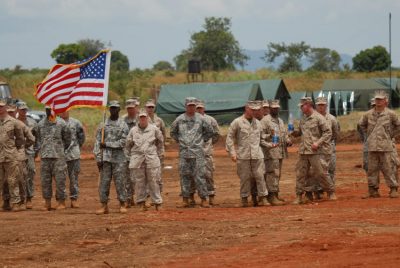The US “Leading From Behind” in Africa Lets Russia “Lead From the Front”

The Pentagon’s decision to downscale its footprint in Africa makes Russia’s military efforts there more important than ever.
A Pentagon spokeswoman announced that the US will withdraw hundreds of troops from Africa in the next few years in order to focus more on directly challenging Russia and China, taking care to explain that this supposedly won’t impact the effectiveness of the US’ counter-terrorist operations on the continent. According to the official, the US will continue to advise and assist its African allies, meaning that not much will probably change on the ground as it relates to America’s ongoing activities there.
That said, the withdrawal of hundreds of American troops from Africa could create the perception in some of the host countries that the US is downscaling its anti-terrorist commitments to them, thereby opening up the opportunity for Russia to continue flexing its military muscles there as it seeks to become a cost-effective security provider following the model that its pioneering in the Central African Republic. To concisely summarize a complex campaign, private military contractors (PMCs, or “mercenaries”) are operating in the war-torn country per UNSC approval and are aiding the national military in exchange for what some speculate might be profitable resource and reconstruction contracts that could turn Russia into a serious player in the Central African region and beyond.
Coupled with its export of military equipment, Moscow’s “mercenary services” and post-war development plans form the basis of a new strategy of engagement with the continent, one which is greatly advanced by the notion that the country is a neutral “balancer” with no desire to compel its counterparts into any political concessions like the US and France are known for doing. Importantly, this makes Russia an exceptionally attractive partner for African states and their Chinese ally alike seeing as how the latter is in dire need of reliable security solutions to safeguard its Silk Road investments, albeit ones that avoid the trap of “mission creep” and don’t inadvertently feed into the US’ infowar narrative that some of Beijing’s global connectivity projects have secret military motivations behind them.
For its part, Russia not only has an interest in replacing the US in Africa and exporting its Syrian-tested stabilization and “balancing” models there (though in this case through much more indirect and low-scale commitments), but it might also have more ambitious plans of partnering with China’s Silk Road all throughout the “Global South” via the security-related services that it could possibly provide to Beijing in exchange for obtaining a share of its host countries’ markets in the spheres that Chinese companies already dominate. Should that be the strategy at play and it actually turns out to be successful, then Russia would be masterfully exploiting the US’ “Lead From Behind”strategy in Africa to pragmatically “Lead From the Front” in support of China there, which could potentially represent a game-changing twist in the way that the New Cold War unfolds in the “Global South”.
*
Note to readers: please click the share buttons above. Forward this article to your email lists. Crosspost on your blog site, internet forums. etc.
This article was originally published on Eurasia Future.
Andrew Korybko is an American Moscow-based political analyst specializing in the relationship between the US strategy in Afro-Eurasia, China’s One Belt One Road global vision of New Silk Road connectivity, and Hybrid Warfare. He is a frequent contributor to Global Research.
Featured image is from US Army Africa / CC BY 2.0

